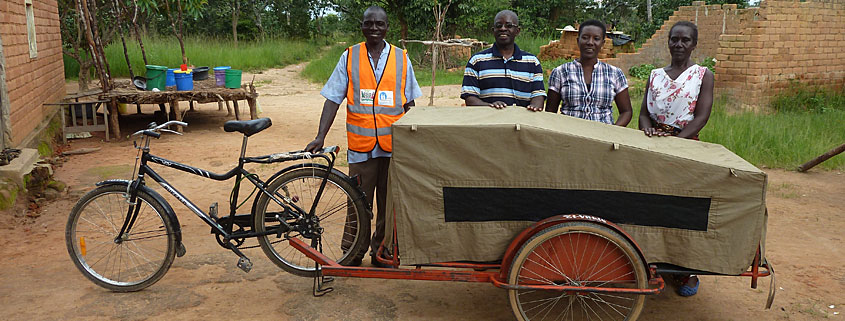Josephine saves four lives (Transaid News)
Josephine Mupeta potentially saved four lives when she carried two pregnant women to a health facility. Josephine is one of the volunteer riders using bicycle ambulances to transform the lives of communities in sub-saharan Africa.
It was November, just a few weeks after the bicycle ambulance arrived in the community. Josephine – a volunteer health worker from Serenje District in Zambia – was on her way to collect a woman with a complication in labour to take her to the health facility when she heard a second woman also needed emergency transport.
When she reached the second woman, after collecting the first woman, she realised she was in a far more serious condition, so she moved the first woman onto the parcel carrier at the rear of the bicycle and placed the other woman on the bicycle ambulance’s stretcher.
She then continued cycling for a couple of hours to reach the health facility where both women received treatment and safely gave birth to their babies.
That day, Josephine cycled that bicycle ambulance like she does every time she is needed – motivated by the opportunity to save the lives of mothers and their babies.
The More MAMaZ programme
In Zambia, the risk of a maternal death is 1 in 79, compared to 1 in 5,800 for women in the UK, according to World Bank data. Add to this a striking urban-rural divide – only half of rural births are attended to by a skilled healthcare provider, compared to nearly nine in ten urban births.
Between Josephine and the other 199 bicycle ambulance riders trained in the programme, a total of 4,105 mothers were transferred to health facilities in less than two years.
The transport industry funded the original research into bicycle ambulances. The More MAMaZ programme is funded by Comic Relief and supports work by the Ministry of Health. Transaid implements this project with a consortium that includes Health Partners International, Development Data, and Disacare.
Facts from the More MAMaZ programme include:
- 4,105 women have been transferred to a health facility by Emergency Transport Scheme (ETS) drivers, one of the factors leading to a rise in institutional delivery rates at 89%.
- 82,205 door-to-door visits have taken place at homes of pregnant and newly delivered women by Community Health Workers and 89% of women and girls feel empowered to achieve a safe pregnancy.
- The programme has also tackled other important community issues – 89% of men and 88% of women report a decrease in gender-based violence (GBV).
– See more at: http://www.transaid.org/news/josephine-saves-four-lives/#sthash.zjySLPIl.dpuf



